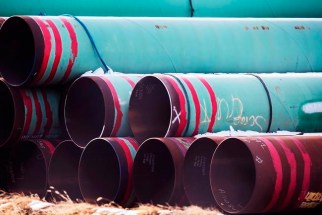Support wanes for Keystone XL pipeline
Read this article for free:
or
Already have an account? Log in here »
To continue reading, please subscribe:
Monthly Digital Subscription
$0 for the first 4 weeks*
- Enjoy unlimited reading on winnipegfreepress.com
- Read the E-Edition, our digital replica newspaper
- Access News Break, our award-winning app
- Play interactive puzzles
*No charge for 4 weeks then price increases to the regular rate of $19.00 plus GST every four weeks. Offer available to new and qualified returning subscribers only. Cancel any time.
Monthly Digital Subscription
$4.75/week*
- Enjoy unlimited reading on winnipegfreepress.com
- Read the E-Edition, our digital replica newspaper
- Access News Break, our award-winning app
- Play interactive puzzles
*Billed as $19 plus GST every four weeks. Cancel any time.
To continue reading, please subscribe:
Add Free Press access to your Brandon Sun subscription for only an additional
$1 for the first 4 weeks*
*Your next subscription payment will increase by $1.00 and you will be charged $16.99 plus GST for four weeks. After four weeks, your payment will increase to $23.99 plus GST every four weeks.
Read unlimited articles for free today:
or
Already have an account? Log in here »
Hey there, time traveller!
This article was published 11/02/2021 (1762 days ago), so information in it may no longer be current.
The stars are aligning for Canada’s fossil fuel industries. The only question is whether they, supported by the federal government, will seize the unprecedented opportunities that lie directly ahead.
In the past month alone, the ground has shifted. U.S. President Joe Biden, as one of his first executive orders, cancelled approval of the Keystone XL pipeline project. This 1,800-kilometre pipeline would carry 800,000 barrels of Alberta crude oil each day to Nebraska, where it would connect with the first leg of Keystone and take the oil to Gulf of Mexico refineries.
Also in January, General Motors announced it will transform its entire product line to zero-emission electric technology by 2040. In making this pledge, GM joins other automakers such as Volvo, Toyota and Nissan that have also agreed to ditch the internal combustion engine.

Together, these events create a potent market argument for weaning this country’s economy off its deep, structural reliance on oil and gas production in favour of more sustainable industries. It’s unclear, however, whether Prime Minister Justin Trudeau will seize this opportunity.
In his first telephone call with Mr. Biden, Mr. Trudeau expressed his “disappointment” about the Keystone decision. In comments to reporters later, the prime minister said he was especially concerned about the cancellation’s impact on workers in Alberta and Saskatchewan who rely on the oil patch for their livelihood.
However, if Mr. Trudeau is truly concerned about those workers, he will launch a program to help business create a new generation of jobs for oil-patch workers — jobs that have no connection to fossil fuels — while ceasing efforts to save Keystone.
And make no mistake, there will be efforts to save Keystone. Democrat and Republican lawmakers alike in affected states are applying pressure on Mr. Biden to reverse his decision. Alberta Premier Jason Kenney and Saskatchewan Premier Scott Moe, among others, have called for trade sanctions and the pursuit of possible financial compensation — measures which stand very little chance of succeeding.
Behind all the bluster, the proponents of Keystone know Mr. Biden is likely to stick with his original decision because it is, both materially and symbolically, essential to maintaining some semblance of credibility on environmental issues with his own party and the public at large. Canadian crude will still make its way into the U.S. via other means, but reversing course on Keystone would create a broad array of political problems Mr. Biden is unlikely to want to face, as they run counter to other policies he has introduced to drive economic growth and combat climate change.
Even as Mr. Kenney and Mr. Moe have raged against the cancellation of Keystone, Canadians in general, and Albertans in particular, are more open to moving in another direction.
Even as Mr. Kenney and Mr. Moe have raged against the cancellation of Keystone, Canadians in general, and Albertans in particular, are more open to moving in another direction.
An Ipsos-Global News poll released this week shows 44 per cent of Canadians and a remarkable 56 per cent of Albertans support abandoning Keystone to concentrate on building infrastructure within Canada to transport oil and gas. Only 18 per cent of Canadians and 21 per cent of Albertans think Canada should go to war with Mr. Biden over Keystone.
More importantly, 38 per cent of all respondents said Canada should focus on economic priorities other than the export of oil and gas.
The door is open to a generational transformation of the Canadian economy, for the benefit of all Canadians and also the environment. The question is whether Mr. Trudeau will have the courage to walk through it.













